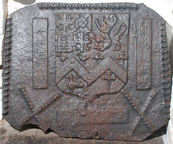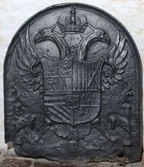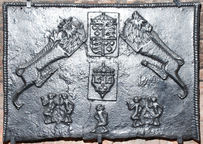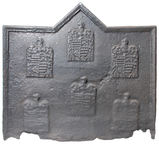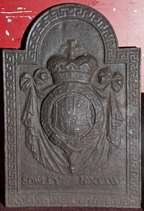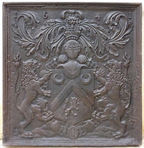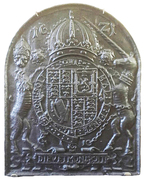-
1126
Description: Canted rectangular shape; twisted rope edging (top and sides); cavetto-moulded-edged rectangle top centre, enclosing date between initials CT; five shields of Ayloffe impaling Sulyard in two rows (3-2); Ayloffe: sable, a lion rampant Or, collared gules, between three crosses formy of the second; Sulyard: argent, a chevron gules between three pheons inverted sable.
Notes: William Ayloffe (c1535-1584) of Bretons, Hornchurch, Essex, Justice of the Court of Queen’s Bench, married (c1560) Jane, dau. of Sir Eustace Sulyard, of Runwell, Essex. The initials 'CT' are likely to be those of Charles Tyler, a founder whose working life and that of his family have strong parallels with the occurrence of these firebacks. The smallest dated example in this series.
Inscription: C.1.6.0.9.T
Arms: Ayloffe impaling Sulyard (William Ayloffe of Bretons, Hornchurch)
- Decoration tags:
- rectangular with canted top corners (shape)
- rope (edging)
- carved stamps
- individual letters
- individual numbers
- heraldic
- armorial
- text
Manufactured: in 1609 possibly at Bedgebury Furnace, Goudhurst in the Weald area of England.
Current location: The Crown Inn, The Green, Horsted Keynes, West Sussex, England.
- Attached to series:
- Ayloffe series
- Personal armorial firebacks
-
334
Description: Quasi-rectangular; twisted rope lengths along top and sides; centre top, quartered shield between two vertical carved stamps of a billet with five oval shapes; the same billet is repeated horizontally below between two irregular twisted rope saltires.
Notes: The arms are probably of Thomas Wriothesley, who was Henry VIII's last Lord Chancellor and created Earl of Southampton in 1547; he married c.1533 so the arms could date to before then, but the same arms are displayed on his enamelled stall plate in St George's Chapel, Windsor, of 1545, and in stained glass in a window in the parish church at South Warnborough, Hampshire. The shield is, quarterly, 1. Wrythe or Wriothesley quartering Dunstanville and Pink, 2. Drayton, 3. Crocker and 4. Peckham. A candidate for the earliest English fireback with an example of personal arms. A similar fireback is no. 1305.
Arms: Wriothesley (Earl of Southampton)
- Decoration tags:
- rectangular (shape)
- rope (edging)
- simple stamps
- carved stamps
- armorial
- objects
Manufactured: in the mid- to late-16th century in the Weald area of England.
Current location: in private hands, Huddington, Worcestershire, England.
Citation: Gardner, J. S., 25 May 1907, 'Old Wealden Ironwork at Warnham Court', Country Life, pp. 730-2.
- Attached to series:
- Personal armorial firebacks
- Royal series
- Wriothesley firebacks
-
336
Description: Arched shape; cavetto moulded edge; double-headed eagle displayed, a crown above; in front, a quartered shield.
Notes: The shield bears the arms of Charles V, Holy Roman Emperor (reigned 1519-1556), king of Spain and nephew of Katherine of Aragon, Queen of England.
Arms: Charles V, Holy Roman Emperor
- Decoration tags:
- rounded arched (shape)
- cavetto (edging)
- whole carved pattern
- armorial
- royal
Manufactured: in the mid-16th century possibly in the Eifel area of Germany.
Current location: in private hands, Huddington, Worcestershire, England.
- Attached to series:
- Foreign armorial firebacks
-
347
Description: Rectangular; twisted rope edging (top and sides); central Tudor shield, garter, crown and supporters (greyhound and lion), formed from separate stamps; date on a single stamp in top left corner.
Notes: The worn appearance of the central arms, compared with the clarity of the date, suggests that this is an early example of a fireback being used as a pattern, with the addition of a subsequent date. The same stamps forming the arms can also be seen on other firebacks. The extension of the lower part of the ‘3’ on the date stamp suggests that the numbers may have been fixed to the backing block, rather than the date being carved as a whole. Another variant of this fireback has the rope edging extending only three-quarters of the way down the sides.
Inscription: 1583
Arms: Tudor royal
- Decoration tags:
- rectangular (shape)
- rope (edging)
- carved stamps
- date stamp
- armorial
- royal
- text
Manufactured: in 1583 in the Weald area of England.
Current location: Ightham Mote, Ightham, Kent, England.
Museum number: 825358 (part of the National Trust museum group)
- Attached to series:
- Pounsley series
- Tudor royal armorial firebacks
- Tudor redated series
-
345
Description: Rectangular; twisted rope edging (top and sides); from top, crowned Tudor royal shield (stamp overpressed) above crowned shield bearing initials, KH in Lombardic lettering, above a fleur de lys (stamp overpressed); to left, diagonal lion passant guardant sinister; to right, diagonal lion passant; at base, single 'imp' figure, arms to side, moving left but facing right, between two pairs of 'imp' figures (separately stamped), one moving left, right arm raised, the other moving right, right arm raised.
Notes: One of the 'Royal' series.
Arms: Tudor royal arms of England
- Decoration tags:
- rectangular (shape)
- rope (edging)
- carved stamps
- heraldic
- armorial
- animals
- humans
Manufactured: in the mid-16th century in the Weald area of England.
Current location: Ightham Mote, Ightham, Kent, England.
Museum number: 825393 (part of the National Trust museum group)
- Attached to series:
- Royal series
-
836
Description: Rectangular with triangular arch; ovolo-moulded edging (top and sides); small stamp of a quartered shield with helm, crest and mantling above the date '1571, initials split either side of shield, repeated six times in two lines of three, the middle stamp of each line higher than the other two.
Notes: The arms may be of the family of Humberston quartered with another; the stamp would have been made specially for the fireback, the date and initials being carved with the arms.
Inscription: I H / 15 71 [repeated 6 times]
Arms: Humberston family
- Decoration tags:
- rectangular with triangular arch (shape)
- ovolo (edging)
- carved stamps
- armorial
- text
Manufactured: in 1571 in the Weald area of England.
Current location: Christchurch Mansion, Ipswich, Suffolk, England.
(part of the Colchester & Ipswich Museums Service museum group)
Citation: Traill, H. D. & Mann, J. S., 1902, Social England vol. III, (London, Cassell), p. 732.
- Attached to series:
- Personal armorial firebacks
- Triangle arch series
-
1108
Description: Arched rectangular shape; Greek Key border with fillet edges; in high relief, in front of swagged drapery, the shield of, quarterly, France quartering England, Scotland and Ireland, surrounded by a Garter, and surmounted by a ducal coronet; below, the inscription in capitals.
Notes: The use of the Greek Key design as a border is believed to be unique for an English fireback. Although somewhat indistinct, the use of the Stuart royal arms and the ducal coronet can be explained by the fact that the fireback was one of a group cast for the 2nd Duke of Richmond, whose father, the 1st duke, was the illegitimate son of Charles II and Louise de Kéroualle. The Richmond arms were differenced from the Stuart royal arms by the addition of a bordure compony (the detail of which is not distinct on this casting). Sowley Furnace, near Beaulieu in Hampshire, was owned in 1732 by John, 2nd Duke of Montagu, and was let to Miles Troughton. Similar, but larger, variants of this fireback are at Goodwood House, the seat of the Dukes of Richmond, where this fireback is likely to have once been. Criterion Auctions, Islington, 7 Jan 2019, lot 128 (£50).
Inscription: HONI SOIT QUI MAL Y PENSE / SOWLEY MDCCXXXII
Arms: Duke of Richmond
- Decoration tags:
- rectangular with round arch (shape)
- fillet (edging)
- carved pattern panels
- heraldic
- armorial
- royal
- text
Manufactured: in 1732 at Sowley Furnace, Beaulieu in the New Forest area of England.
Current location: not known.
-
1014
Description: Rectangular with moulded edging; shield, forward-facing helm, lion's head crest, mantling, lion supporters, and collar of the Order of St Michael
Notes: The arms are probably those of Jean Bouchu (1597-1653), French parliamentarian: azure, a chevron between, in chief, two crescents and, in base, a lion rampant sinister or.
Inscription: 1641
Arms: Bouchu
- Decoration tags:
- rectangular (shape)
- complex individual (edging)
- whole carved pattern
- armorial
- text
Manufactured: in 1641 in France.
Current location: Claude Augustin Antique Materials, 104 Route Nationale 6, 69380 Les Chères, Rhone, France.
- Attached to series:
- Foreign armorial firebacks
-
355
Description: Rectangular joined to pediment by symmetrical scrolls; fillet edging with embattling inside; shield, helm, crest, supporters and mantling of the city of Bristol; date split by bottom of shield; inscription in an oval cartouche below shield.
Notes: Both '3's in the date are a substitution, with another casting suggesting an original date of 1614 or 1624. The pattern-maker was also responsible for carving royal coats of arms in three West Country churches and a small number of series of firebacks in the first quarter of the 17th century.
Copies of this fireback are known.
Inscription: 16 33 / [ARMES] BRISTOLL
Arms: City of Bristol
- Decoration tags:
- rectangular with detached pediment (shape)
- fillet (edging)
- whole carved pattern
- individual numbers
- armorial
- text
Manufactured: in 1633 possibly in the Forest of Dean area of England.
Current location: Kenilworth Castle, Kenilworth, Warwickshire, England.
Museum number: 88278827 (part of the English Heritage museum group)
- Attached to series:
- Civic firebacks
- Bristol armorial series
-
994
Description: Arched; cavetto-moulded edging; English royal Stuart shield, garter, crown, supporters, and motto on a cartouche; a monogram of S and C lies to the left of the Garter buckle; a small rose stamp is repeated each side of crown; date split each side of top of crown.
Notes: Although English arms, the design is in a continental style, arched firebacks being typical of Lorraine. In some later recastings the proportions have been distorted, making them narrower, and the '16' of the date is missing. The fireback illustrated was formerly in the city museum of Vlissingen in the Netherlands.
Copies of this fireback are known.
Inscription: 16 21 / HONI SOIT QVI MAL I PENSE / SC / DIEV ET MON DROIT
Arms: English Stuart royal (James I)
- Decoration tags:
- rounded arched (shape)
- cavetto (edging)
- whole carved pattern
- heraldic
- monogram
- armorial
- royal
- text
Manufactured: in 1621 possibly in the Ardennes area of Belgium.
Current location: not known.
Citation: Gardner, J. S., 1898, 'Iron Casting in the Weald', Archaeologia, 56, 1, pp. 133-164.
- Attached to series:
- Jacobean royal armorial firebacks
- Stuart royal armorial firebacks

